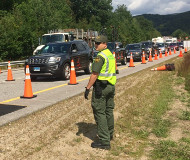8/30/2017
US Border Patrol Sets Up New Hampshire RoadblocksFederal roadblock set up 100 miles from Canadian border in New Hampshire creates massive traffic jam.

Motorists traveling one hundred miles away from the US border with Canada found themselves stopped and searched by federal agents this weekend. The US Border Patrol set up the roadblocks on Interstate 93 near Woodstock, just barely within the US Supreme Court's definition of an extended "border zone" that allows the use of checkpoints to verify immigration status and conduct suspicionless searches.
In this case, the three-day roadblock operation did not turn up Canadians illegally immigrating to the United States. Instead, authorities claimed that they found fourteen Colombians staying on expired visas, along with eleven illegal aliens from Brazil, Ecuador and Mexico. Unlike I-91, I-93 does not directly connect to the Canadian border.
Residents were caught by surprise by the cones and barriers erected on the southbound freeway lanes. An electronic sign explained with the message "Federal Agents Ahead" while some drivers found themselves delayed by up to an hour and a half.
"Traveling south on I-93 in northern New Hampshire today, we saw something we haven't ever seen in New England before -- Immigration and Customs Enforcement had a roadblock on the interstate, checking all vehicles," motorist Bruce Hillis wrote on Facebook. "Even had a drug dog. Are they worried about Canadians sneaking in?"
Despite the motto "Live Free or Die" on its license plates, New Hampshire has accelerated the use of roadblocks throughout the state. Earlier this year the state legislature gave Border Patrol agents operating to the north in Coos County the full authority of state law enforcement officers.
At the local level, the Bristol Police Department on Monday reiterated its support for roadblocks despite local media coverage pointing out that the driving under the influence (DUI) checkpoints have resulted in relatively few actual arrests for drunk driving. The department announced more roadblocks, conducted with state troopers, would be set up over the Labor Day weekend.
"In a continued effort to decrease the incidents of drinking and driving, the New Hampshire State Police applied for and was granted a Superior Court Order to conduct a sobriety checkpoint," the department explained.
Local and state police receive grants from federal gas tax funds to pay officers overtime to run the roadblocks. The Concord Monitor reported that 0.37 percent of those stopped at a state roadblock in 2010 were ever charged with drunk driving. The Union Leader newspaper found similar results in Manchester, where just three DUI arrests were made in the city's last nine roadblocks.


